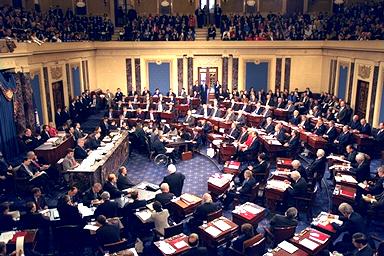Senate Should Act First
Posted on May 24, 2011
 “Après vous, Monsieur Senate.”
“Après vous, Monsieur Senate.”John Boehner should say that to his friends in the upper chamber when it comes to raising the debt limit.
I know the parliamentarians in the crowd will say that because the debt limit is at heart a revenue issue, the House, constitutionally, should go first, but there are plenty of ways to avoid a blue slip on this issue.
It used to be that the House always went first in raising the debt limit, and it usually did that by using the so-called Gephardt rule, a parliamentary device that allowed the lower body to bury an increase in the budget resolution.
Republicans did away with that rule in the beginning of this Congress in the name of transparency, and now they are stuck with the result.
Any debt-limit increase is extraordinarily unpopular with the voters. That is not a new phenomenon. Like a congressional pay raise, an increase in the debt limit is pretty hard to explain to constituents. Members can talk all they want about the need to pay the troops and send out Social Security checks, but if they are talking about this issue as they campaign for reelection, they are in big trouble.
House Republicans have already stuck their heads out pretty far on a vote for a budget resolution, a budget resolution that by its very definition will never become law and apparently will never be considered by the Senate. (And parenthetically, a vote on a resolution that said nothing about Medicare reform, except for putting in a notional number about what we will spend on Medicare for the next 10 years, despite all the political hoopla surrounding it.)
The fact that the Senate majority leader has been able to lead a chamber that, in direct conflict with the law, hasn’t bothered to produce a budget, even at the committee level, for more than two years can be seen as the height of irresponsibility, a masterstroke of political strategy or both. That Reid was able to survive favorability ratings akin to Attila the Hun, and still easily win reelection, says something about his political acumen.
Reid represents Las Vegas, and knows something about poker playing. He has kept his cards very close to his chest. He has let the gangs of the Senate run around in a tizzy and die on their own accord, he has let the House Republicans proceed with politically tough votes, he has let his colleague Chuck Schumer lob partisan grenades, and he has let his Budget Committee chairman twist slowly in the wind, all as he has kept his own counsel about what he plans to do on the debt limit.
It is time for the American people to see what cards the Senate majority leader is going to play and, more importantly, what plans he has to increase the debt limit. If adding a couple of trillion dollars more to the credit card is so important to President Obama, then Reid should take the lead in making that happen.
Harry Reid knows he won’t get a clean debt limit. He might want to take a vote on that and see the vulnerable members of his conference abandon him. He then could see if he could pick off some moderate Republicans like he did on the stimulus package two years ago. My guess is that a debt-limit increase is so toxic, Mitch McConnell will have no trouble unifying his caucus. At that point, Reid will actually have to negotiate with his Republican counterpart on a deal that can pass the Senate.
By insisting that the Senate go first, Boehner gets the right of first refusal. If he doesn’t like the Senate deal, he can try to change it, which would require the participation of his entire caucus. Or he can try to pass the deal with the active participation of the House minority whip, Steny Hoyer.
In any event, it is about time that the Senate does something, anything, to deal with our nation’s budget problems. Boehner should insist that the Senate go first when it comes to raising the debt limit and finally have it show its cards of where it stands on the issue of fiscal responsibility.
